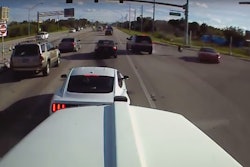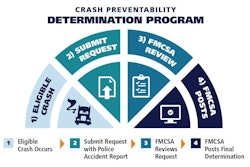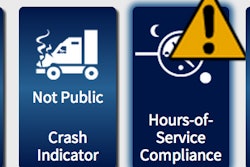
The Motor Carrier Regulatory Reform coalition certainly thinks so, according to a petition for such filed last month with the Federal Motor Carrier Safety Administration that, if pursued, would take the current ad hoc procedures around crash removal from CSA scoring into more formal territory. You can read the petition via this link, filed with FMCSA’s request for comment on its proposed expansion of the Crash Preventability Demonstration Program. Attorney Hank Seaton walked me through the concerns the coalition — which includes the National Association of Small Trucking Companies, Apex Capital, an expediting association, the ASECTT group and several other organizations — as they relate particularly to small businesses and risks of having a preventability determination on the books and publicly available for insurers, personal-injury lawyers and anyone else to see.
Chief in the concern is those crashes that go through the process FMCSA has laid out for review and removal from the CSA Safety Measurement System scoring metric in the crash category… Those crashes, I should say, that go through that process and are deemed in fact preventable, and not removed from the scoring. As with the SMS’ golden triangles of old (no longer publicly displayed after Congressional intervention with the FAST Act) serving as a potential scarlet letter for a carrier in any of the five public categories of measurement in the CSA Safety Measurement System, get a preventable determination on a crash that fit parameters for participating in the review program, this is what the agency is proposing to happen:

Effective for crashes on or after August 1, 2019, for any of the 15 types noted above, FMCSA would continue to display the crashes in SMS with notations of not preventable, preventable or undecided but would remove crashes with not preventable determinations from the SMS Crash Indicator BASIC calculation. FMCSA will also note the not preventable determinations in PSP. FMCSA proposes that preventable determinations would not be noted in PSP because the driver may not be aware when the motor carrier submits a crash that results in a preventable determination. The Agency is specifically interested in receiving comments on this issue.
All the crashes would remain displayed, in effect, and now carry a stamp of preventability, which Seaton believes will be reinterpreted by personal injury attorneys and insurers as something that it’s not: “legal liability” for the crash in the event of preventable determinations.
In a letter to FMCSA’s Chief Counsel Jim Mullen requesting that the agency remove its request for comment on plans to expand its Crash Preventability Demonstration Project, Seaton called the preventability term “an artificial construct which is conflated by plaintiff’s bar with legal liability or fault.”
Prognosticators and reporters around the industry conflate the fault/preventability terms all the time, really. Seaton points to a report in Transport Topics by Eric Miller in early August, shortly after the agency introduced the idea to expand and potentially make more permanent the preventability demonstration program. The title of that report: “Crash not your fault? FMCSA says soon it won’t hurt your CSA score.” Determinations of legal liability for a crash, of course, are not what preventable/non-preventable analyses are determining. Conflations like these in press, however, give cover for those wont to argue that in fact they are.
That said, the program for sussing out whether crashes are preventable or not, ultimately, is laudable in my mind in one important respect: it’s aimed at scrubbing the scoring system of the numerous on-highway events that are clearly accidents the truckers involved could not avoid and that shouldn’t contribute to a safety score in any way, shape or form. I’d argue they shouldn’t contribute to the record in any shape or form and that the agency might go farther and actually remove those crashes with non-preventable determinations from the system entirely, rather than just stamping them non-preventable.
However, putting a preventable or even undecided stamp on the crashes deemed otherwise that remain in the system, publicly available for inspection, is a move that, as the MCRR coalition argues, could easily have unintended consequences.
That’s not its only issue. The burden of proof in the preventability demonstration program rests with those involved in the crash, conducted as it is through the agency’s DataQs review program. It’s not hard to find instances where agency requests for more information from carriers attempting to get crashes removed through it lengthen the review process by months. To wit: The first commentary you see as of this morning when you visit the open comments docket on FMCSA’s latest proposed expansion of the program, from Tony Garcia of ProPetro Services:
I submitted a request for review along with a [Police Accident Report] on a fatality back on May 7, 2019. The accident date was February 23, 2019. The driver who died was under the influence and struck our vehicle after impacting with another vehicle first. This driver failed to stop at an intersection, probably passed out at the wheel. I received a request to provide post-accident testing documents for our driver on June 13, 2019, and submitted the requested documents on June 17, 2019. It’s been pending review since, and on August 28, 2019, I submitted a request for update and have not heard still. I think the program is good, but the process is taking too long, hence affecting our safety profile meanwhile. Thus affecting our safety performance score, which our customers look at and request, to ensure our company is doing the best to stay compliant with all regulations. The only suggestion I have is that the review process needs to be quicker; in my case, we are going on four months with no decision.
“When you take a burden of proof,” says Seaton, “and shift it onto the accused, you violate basic due process.”
Carriers like Garcia’s aren’t in a court of law. They are not being accused of a crime. Yet the existence of the record of a fatality crash for those four months and however longer the DataQs review takes sure makes it feel like that, I’m sure. If you haven’t examined the crash-preventability program expansion the FMCSA has proposed, here’s our late-July story on it.
The full proposal FMCSA made, including new crash categories it’s proposing for review and plans for how to handle the determinations, is available via this link to Regulations.gov notice.
The comment period on this proposal is open through October 4. To date, just 65 comments have been made.










